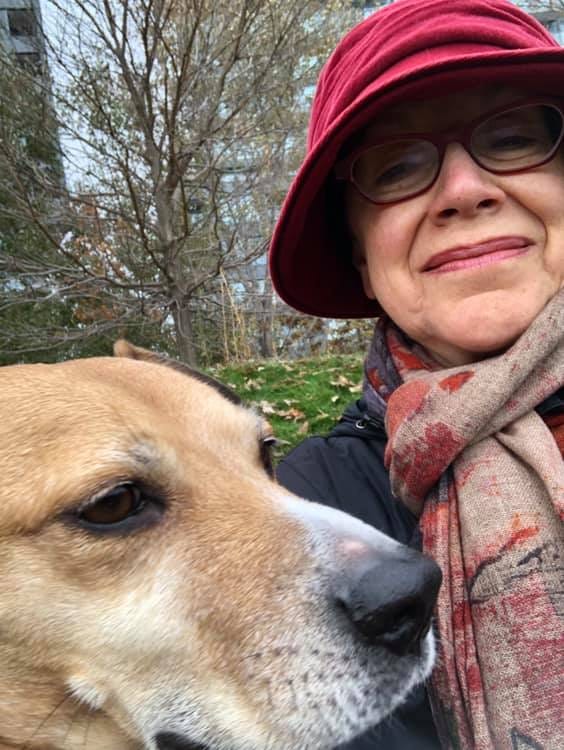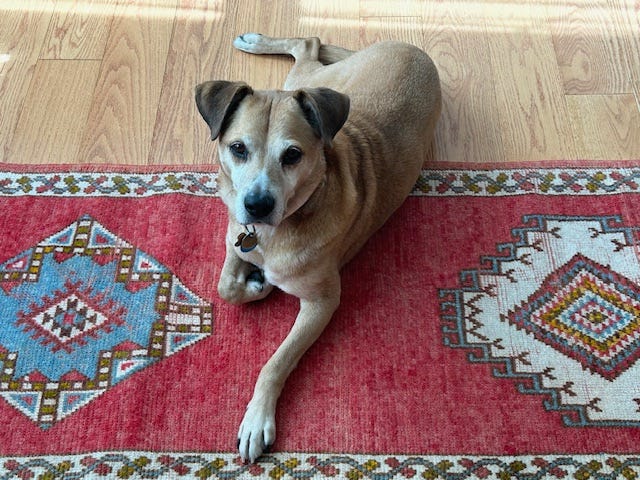Here I Am
Loss is coming for me, but not yet. And premature mourning won't hold it at bay.

For nine years, five months and a number of weeks, I’ve wondered what my dog would say if he could talk. The other day it struck me he’s been talking all along. We had just about reached the park—his tags jingling, the leash swaying in my hand, his four feet keeping time with my two—when I felt him say with every step, “Here I am.” The hereness of him quivered in my palm and awakened the lilt in my step. It gilded the morning, a cool one for summer, the sky crayon-blue and the milkweed swelling.
Casey and I are both geezers now, but on such a day we saunter like pups. Days like this have flown like milkweed fluff since the park was new and we had it all to ourselves. We walked here when the trees were saplings that shuddered in a stiff wind, and from the nearly naked lookout point, which now is a chapel of leaves, I saw workmen move stoves and fridges into condos where no one lived. We were here before the families with balloons and picnic hampers, before the exercisers hoisting kettle bells, before the first carrot-nosed snowman, which Casey claimed as a billboard for a torrent of pee. Through earthworms and robins, trillium and Queen Anne’s Lace, we were here—a woman following a thought on its meandering path to a sentence, and from there to a chapter; a hound following his nose. Every tug on the leash reminded me: Here I am.
August 12, 2024 was the day I understood in every cell what Casey had been saying on our rambles. Four days after I took him to the vet, the place of treats and butt scratches, for what looked to me like a UTI. Something odd was going on. He’d lift his leg to pee, and hardly a drop came out.
Emily Dickinson used to walk a curly-haired giant of a dog, a Newfoundland named Carlo. She never went anywhere without him. Writes Maureen Adams in Shaggy Muses, her linked essays on women writers and their dogs, “Carlo was with her as she scribbled notes for her poems. At night, he slept at her feet while she revised them. Although it is difficult to imagine a poet working in such isolation for so many years, it helps to picture Carlo with Emily,… listening intently as she read a poem to him.”
I think he spoke to her as Casey does to me. He said with his whole being, “Here I am.” While she wandered the realm of her imagination, with all its wild seductions, he warmed the physical space they shared, guarding it for her return. She simulated this dynamic in a poem, “I Started Early—Took My Dog.” It begins playfully as a a stroll by the ocean, which Emily had never seen. The waves put on an enchanting show, with mermaids, frigates and hands extended in what looks to be a welcome—until the water rises past each item of her clothing, from shoes to bodice. A caress? No, an attack. The sea is about to devour her whole—until she arrives at “the solid town” of everyday life. The dog never reappears, yet the poem implies his grounding presence.
In this poem, as in others, Emily portrayed art-making as a dangerous courtship by a force both irresistible and lethal. She felt safe thanks to Carlo, the steadfast friend of her most fruitful period. After his death at 17, she never wrote again at the furious pace of her creative peak. In the first year without him, her pen nearly stilled, she wrote this testament of grief:
Time is a test of trouble
But not a remedy—
If such it prove, it prove too
There was no malady.
Dr. Oscar has looked after Casey ever since we rescued him as a frisky adolescent. “Whatever you’re doing, keep it up,” he likes to say, one hand reaching for a liver treat while the other ruffles Casey’s fur. On the morning of August 8, he told me he would run a few quick tests. Normal, normal, normal. I was paying the bill when I heard Dr. Oscar at my shoulder. Something had come to his attention in the back. He murmured as if to an anxious child, “Rona, I need to speak with you in private.”
There must be people who break down at the news their dog has cancer. Who demand to know why he got the all-clear in a checkup only a few months ago. Dr. Oscar has chosen a famously stressful career, known for high rates of suicide and depression. This kind man would get no histrionics from me. I felt a chill descend as a few words rose out of an inner crypt that held the past nine years and five months of life with Casey. “He’s always been happy dog. We don’t want him to suffer.”
Casey slapped a chair leg with his tail, waiting for another treat. Announcing, as if nothing had changed, “Here I am.”
Casey was a frisky adolescent when my husband convinced me that he belonged with us, our first dog. He could leap a puddle the size of a small pond; he backflipped while lunging at squirrels. At 65, we’d seen how quickly all things come to an end. Our careers in the magazine business, now all but vanished itself. Our son bouncing up and down the many stairs of his childhood, our tenure in four homes that reached their pinnacle of comfort when fluffed for prospective buyers. Dire illness cut down one friend after another, yet the constant presence of a loved and loving dog appeared to stop time.
Casey likes his life exactly as it is—the favorite corner and peeing tree, his tried-and-true circuit between sleeping spots. To him every day is tied for best day ever, and its predictable pleasures have become our metronome. As day flowed into day, his trot slowed to a shuffle and he no longer heard us call him to the space between us on the TV couch. Familiar dogs we’d met on our walks began to disappear—the pair of grizzled beagles, one by one; the three-legged Lab who held court outside St. Lawrence Market, the gentle Great Dane who frightened Casey by being too big for this world. I knew Casey’s time would come. Yet as long as the kibble still cascaded into the bowl and his blanket waited on the couch, I let myself believe we were forever.
When my father was courting my mother, he charmed her with a South African song that begins, “Here am I, here am I/ And I’ll stay here till I die.” She eventually fell out of love with my father and was never much of a singer, but in her last years I heard her sing “Here Am I” more than once. You can love someone whose presence you can no longer bear. Hereness, when you embrace it, is the greatest love on offer.
Casey will stay here till he dies. There’s not a corner of my home or neighborhood that he hasn’t stamped with his presence, and my eyes mist over at the thought of being here without him. I try to channel William Blake and kiss the joy as it flies, but grief is having its way with me. Over and over, I play sad songs. Dave Van Ronk lowers Old Blue into the ground with a golden chain. Gillian Welch yippee-ki-iy-ays as a cowboy trades his spurs for wings, and his pony is set free to roam. Casey has a horror of the equine family. With bays and bristling hackles, he says they don’t deserve to exist. Yet I always listen for the sweet ache of that pony.
Meanwhile Casey goes on loving his life These last afternoons of summer, he stakes out a patch of carpet fleetingly transformed by the sun into his personal beach. There I found him just now, meeting my gaze as the best day ever drew to a close. Telling me one more time, as he will for who knows how many days, “Here I am.”
My friends, your presence gladdens me today. I can’t be sad when readers share thoughts as if we were sitting at the same kitchen table. Have you found a way to kiss the joy as it flies? Or had to say goodbye to a beloved animal? What’s the most important thing you’ve learned from a non-human creature?
This post happened to arrive on the heels of ’s perceptive essay inspired by my memoir Starter Dog, and ’ podcast interview on how it came to be. We covered lots of writerly ground, from crafting vivid scenes to finding the shape of your narrative. Thank you, Betsy and Estelle, for sharing my book with your communities.
Although my posts are free to read and will remain so, I’d be overjoyed if you’d consider a paid subscription. Either way, I’m honored to have you in my story circle. You could be walking your dog or baking blueberry muffins, but here you are with me. I don’t take it lightly. Next Sunday you’ll find me right here with a fresh pot of virtual coffee. I wouldn’t say no to a fresh blueberry muffin.






To all writers who’ve remarked on the crafting of this essay: My model is “A Country Road Song” by the late Andre Dubus (father of Andre Dubus III). Not available online, it can be found in his collection MEDITATIONS FROM A MOVABLE CHAIR. And it’s worth the price of admission to see how this master essayist writes about the catastrophic loss of a leg and an active life in nature, from season to season. The essay is structured in concentric circles and on every rereading I notice some new glory. I’d like to offer a Zoom workshop on this essay to paid subscribers, if interest warrants. You’d have to buy the book, of course.
I love this essay. I’m only sorry that it’s about the impending loss of your beloved Casey. I’ve had many dog and cat family members and with each new arrival I know that I will most likely outlive all of them. I know from day one that our love affairs will be more brief than I would ever choose. I cherish those connections during their lives and in the memories I hold in my heart after they depart. They’re always present for me. Here I am, indeed. I’ve been planning on getting a new tattoo for about a year. This piece confirmed it for me. The tattoo will read “hineni” which is hebrew for “here I am.”
It’s source is Abraham, Isaac, and Moses’s reply to god. It also means “I am here. God, dog. It’s all the same. Sending love to you and your family.